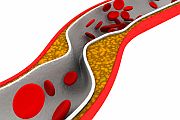- Could Your Grocery Store Meat Be Causing Recurring UTIs?
- Are You Making This Expensive Thermostat Error This Winter?
- Recognizing the Signs of Hypothyroidism
- 10 Strategies to Overcome Insomnia
- Could Artificial Sweeteners Be Aging the Brain Faster?
- Techniques for Soothing Your Nervous System
- Does the Water in Your House Smell Funny? Here’s Why
- Can a Daily Dose of Apple Cider Vinegar Actually Aid Weight Loss?
- 6 Health Beverages That Can Actually Spike Your Blood Sugar
- Treatment Options for Social Anxiety Disorder
Experimental Drug Shows Promise in Lowering Cholesterol, Heart Attack Risk


Adding an experimental new biologic drug to conventional cholesterol-lowering drugs may result in better cholesterol control and reduced risks of heart attack and stroke, according to a new study.
Compared to patients on conventional therapy alone, those who also got the experimental drug evolocumab were half as likely to die, suffer a heart attack or a stroke or be in the hospital to have a procedure to open blocked arteries during the one-year follow-up, said lead researcher Dr. Marc Sabatine.
The combined therapy ”basically halves the rate of cardiovascular events,” said Sabatine, a senior physician in cardiovascular medicine at Brigham and Women’s Hospital in Boston.
“It’s a very impressive risk reduction,” added Sabatine, who’s due to present the study findings Sunday at the American College of Cardiology annual meeting in San Diego. The findings were published simultaneously in the New England Journal of Medicine.
The study was funded by the drug’s maker, Amgen.
Sabatine’s group looked at 4,465 patients who had already completed one of the 12 phase II or III trials to evaluate the drug. The patients were offered an opportunity to join a one-year extension trial. The researchers randomly assigned patients to either standard treatment — usually with cholesterol-lowering drugs known as statins — or to standard treatment as well as the new drug. The evolocumab was injected under the skin either every two or four weeks.
The new drug works by blocking a protein that reduces the liver’s ability to remove LDL — or so-called ”bad” — cholesterol from the blood, the researchers explained.
“This is a new class of drugs. They are being reviewed by the U.S. Food and Drug Administration now, but they are not available yet,” Sabatine said.
The new drug isn’t meant to replace statins, Sabatine said. “Statins will always be the foundation of therapy. These [new drugs] will be an additional medicine for patients who aren’t getting appropriate control of their cholesterol on a statin alone,” he said.
Those on the biologic were about half as likely to have a heart attack or stroke over the one-year follow-up. While 2.18 percent of those in the standard treatment group had a heart attack, stroke or other cardiovascular problem, less than 1 percent of those in the combination group did, the findings showed. Over the follow-up, there were 60 heart attacks, strokes or other such events.
Those getting the combination treatment reduced their bad cholesterol by about 70 milligrams per deciliter of blood, down to about 48 milligrams per deciliter. Some experts advise those at high risk keep their LDL cholesterol lower than 70, Sabatine said.
The drugs, known as PCSK-9 monoclonal antibodies, “have demonstrated impressive reductions in LDL levels,” said Dr. Gregg Fonarow, a professor of cardiology at the University of California, Los Angeles. He reviewed the study findings.
Based on the studies so far, Fonarow said, experts expect that the drug will help reduce both fatal and non-fatal heart attacks and strokes.
However, he offered a caveat about the new study. While those on the combination therapy had half the risk of heart attack and stroke as those on standard statin therapy, the difference between the two groups was small — only about 1 percent. And, the total number of “events” (heart attack and strokes and procedures) was only 60.
“As such, it will be very important to await the findings from the prospective large-scale clinical trials that are evaluating the impact of these agents on cardiovascular events along with their safety,” Fonarow said.
An ongoing study of more than 27,000 patients will provide more information, Sabatine said. The results from that trial aren’t expected until 2017. However, the drug may become available for clinical use before that, pending FDA review, he said.
The expected cost of the new drug isn’t known, but biologics are expensive, with some costing $50,000 a year or more. Statins, the standard therapy, are inexpensive, as many are available now in generic form.
A second preliminary study to be presented Sunday at the cardiology meeting found that another experimental drug, alirocumab, also lowered levels of LDL cholesterol when combined with statin therapy. Another monoclonal antibody, the drug led to fewer heart attacks, strokes and deaths during a 78-week trial, researchers said.
The results of this trial were also published in the New England Journal of Medicine.
More information
To learn more about biological products, visit the U.S. Food and Drug Administration.
Source: HealthDay
Copyright © 2026 HealthDay. All rights reserved.










